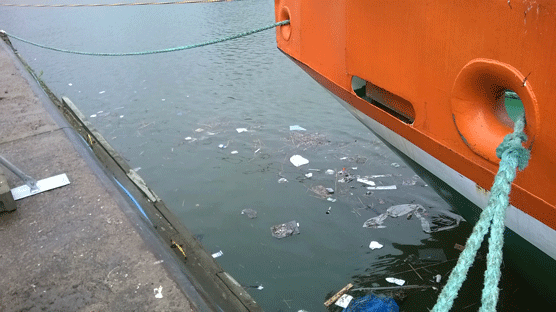This year, the annual International Environment Day reminds us of the harmful effects of plastic litter on the environment. The UN’s World Environment Day takes place on 5th of June. The theme of the day highlights how disposable plastic products have become a globally growing waste problem and how important it is to recycle plastic. This requires joint efforts by citizens, businesses and the countries of the world. Last year, UN member states began negotiations on an international agreement to reduce plastic litter.
The Finnish Environment Institute (Syke) contributes to achieving a sustainable circular economy for plastics in Finland in many ways. Together with our partners, we are searching for solutions to how plastic waste can be reduced and how valuable raw materials can be recycled and reused.

Plastic litter floating in the sea at Länsisatama harbour, Helsinki. © Outi Setälä
Syke participates in solving the plastic challenge
The Finnish Environment Institute works in a variety of ways to stop plastic littering:
- Together with NGOs, municipalities, businesses and schools, our specialists work on solving the litter problem by influencing people's attitudes and behaviour (PlastLIFE project).
- In cooperation with the Finnish Divers` Federation and professional fishermen, we are looking for ways to prevent litter on the seabed (POHJAROSKA2 project, in Finnish).
- In cooperation with several countries, we collect fish trap litter from the Baltic Sea. (RE Fish project).
- Plastic litter, which is dangerous to seabirds can be found in the nests of seabirds (MUPPE project, in Finnish, and the BIODIVERSEA project led by Metsähallitus).
Plastic litter ends up in the environment through various activities, such as construction and the use of plastics in agriculture and in the horticultural sector. The Finnish Environment Institute investigates the harmful effects of plastic litter and identifies their original sources and ways to reduce the litter:
- Construction in coastal areas generates plastic waste that is transported to water bodies and shores, and raw material pellets used in the manufacture of plastic products can be found in the environment. The sources will be determined so that preventive measures can be taken where the waste is created (PlastLIFE and PELLETTIMERI projects).
- We are investigating the plastic load caused by plastic products used in agriculture and in the horticultural sector (PAPILLONS project) and recommend measures to help reduce the plastic load on soil (MicrAgri project).
- We help cities reduce the amount of rubber granules used in artificial turf fields ending up in the environment (TEKONURMI project).
In cooperation with the plastic value chain operators, we are developing methods to better sort plastic waste into plastic collection on the sites where the waste is generated.
"Instead of pronouncing plastic as litter, the used plastic product should be seen as valuable raw material. Plastics and plastic waste can offer many business opportunities in the circular economy," says Senior Research Scientist Helena Dahlbo, Project Manager of the PlastLIFE project.
In the PlastLIFE project aiming at a breakthrough in the sustainable circular economy of plastics, the Finnish Environment Institute together with its partners develops a framework for identifying harmful chemicals in plastics, so that recycled plastic materials can be safely recycled. In the project, Syke's partners also innovate products that are recyclable or contain less plastic and by replacing fossil raw materials with bio-based ones.
Plastics Roadmap towards a sustainable circular economy for plastics in 2030
The Plastics Roadmap guided by the Ministry of the Environment has already guided Finland to a sustainable circular economy for plastics for five years.
PlastLIFE, which is coordinated by the Finnish Environment Institute, promotes the objectives of the Plastics Roadmap for avoiding unnecessary consumption of plastic, enhance the recycling of plastics and replacing virgin plastic manufactured from fossil raw materials. PlastLIFE is an EU-funded national joint project of 17 partners that will last until the end of 2029.
Further information
Communication Specialist Johanna Kaunisto, Communications, Finnish Environment Institute, +358 29 525 2297, email firstname.lastname@syke.fi
Links
Plastics Roadmap for Finland (Ministry of the Environment)
Information about the World Environment Day
Read more about Syke's plastic projects
Re-thinking plastics in a sustainable circular economy (PlastLIFE)
Alternative methods of macro trash-tracking of the seabed (POHJAROSKA2, in Finnish)
Plastics in seabird nesting materials (MUPPE, in Finnish)
Plastic in Agricultural Production: Impacts, Lifecycles and LONg-term Sustainability (PAPILLONS)
Microplastics in agricultural soil – Sources, effects and reduction (MicrAgri)
The discharge and environmental impacts of SBR granules from artificial turf (TEKONURMI)
The key questions of plastics recycling (Muoviavain)